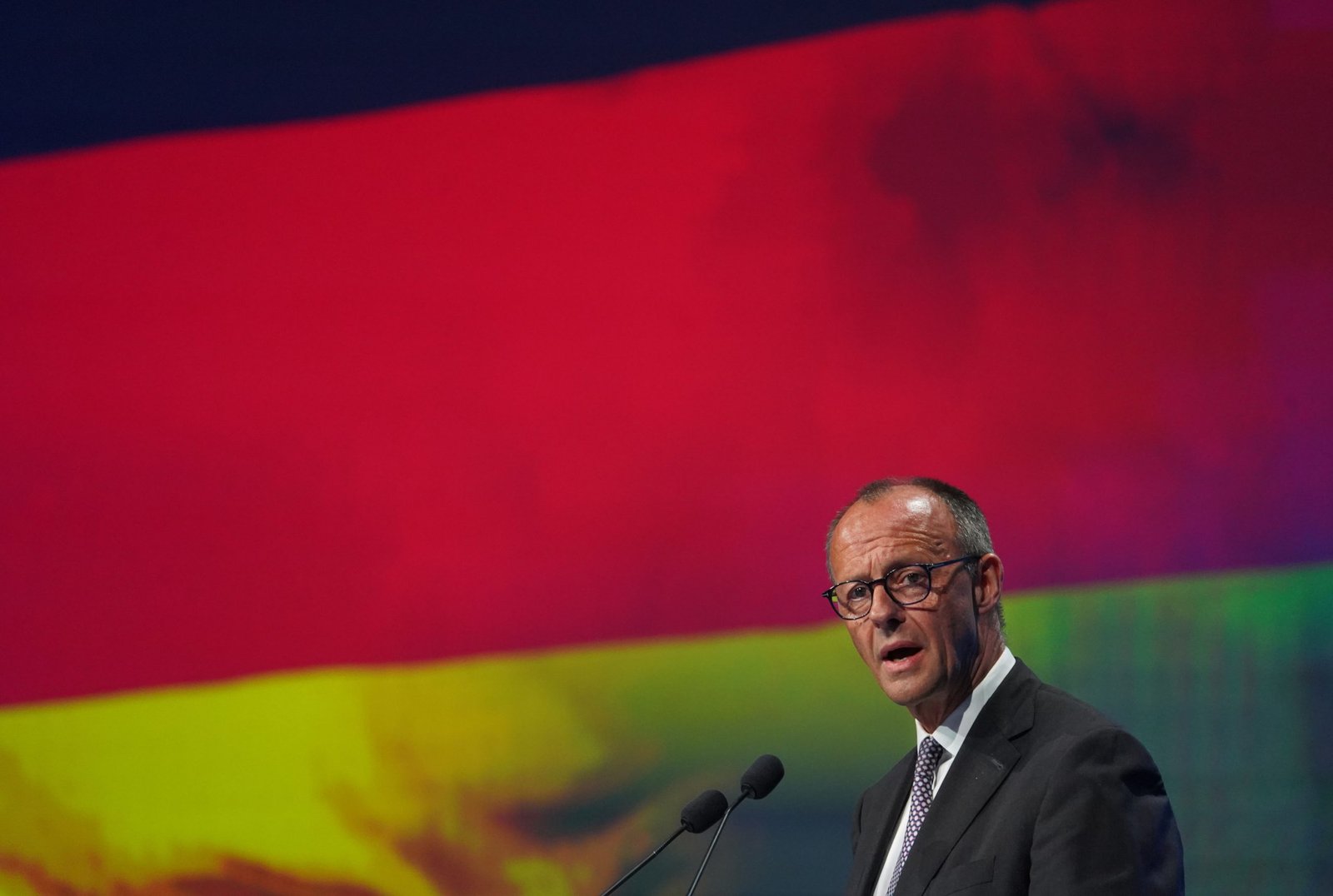BERLIN – By the yardstick of recent history, Friedrich Merz’s first 100 days in office have been a cake walk.
His predecessor, Olaf Scholz, faced Russia’s full-scale invasion of Ukraine just 78 days into his term. Angela Merkel, who had four separate 100-day starts during her 16-year tenure, had to cope with everything from the Greek debt crisis to Russia’s annexation of Crimea to Donald Trump.
That isn’t to say Merz’s challenges have been trivial since he was sworn in on 6 May. The threat from Moscow continues to loom large, as does economic malaise, the continued influx of asylum seekers, not to mention Israel’s war in Gaza.
The new chancellor approached those challenges with grand pronouncements, rolling out not a 100-day programme, but an ‘immediate action plan’, promising that by mid-year, it would be “clear to everyone that Germany is moving forward.”
As Merz reaches both the middle of the year and the 100-day mark on Wednesday, here are the numbers that indicate whether he is delivering on his grand mission.
The angry 18
Merz vowed to end the infighting that plagued the previous three-party “traffic light” coalition. But his coalition, consisting of his Christian Democrats and the Social Democrats (SPD), has one of the slimmest majorities in post-war history, leaving it vulnerable to rebellions.
It took Merz an unprecedented second attempt just to get elected by the parliament, as he received 18 fewer votes than his majority in the first ballot, leaving him six MPs short overall.
The secret vote left the rebels’ motivation in the dark, but it’s no secret that Merz’s polarising style and poor management have made him many enemies among his own ranks. He failed to get frugal Christian Democrats onboard with his sudden decision to ditch Germany’s strict debt rules, a fundamental departure from conservative orthodoxy. Left-leaning SPD lawmakers are wary of his hardcore conservatism.
Merz has not helped his reputation in office. He stumbled into a historic U-turn on Germany’s stance on the Israeli military operation in the Gaza Strip, imposing the first ever country-level sanctions on Israel since the 7 October massacre – without consulting the cabinet or his own outraged MPs, which is bound to profoundly damage his internal standing.
He also failed to defuse a conservative rebellion that thwarted the election of a liberal judge to Germany’s top court, leaving the SPD angry.
Given this erratic leadership style, coalition drama is here to stay.
The trillion-dollar man
Merz’s most dramatic measure came before he even set foot in the chancellery, when he ended the fiscal orthodoxy that had shaped German policy since the 2008 financial crisis.
Germany’s constitutional borrowing limit, the debt brake, had severely constricted the fiscal leeway of the previous government, effectively bringing it down.
Merz’s future coalition, instead, carved out a reform that exempts defence spending above 1% of GDP from the debt brake, and also set up a €500 billion infrastructure fund outside the regular budget.
The result: Germany is on track to rack up a record €850 billion – or $1 trillion – in debt during Merz’s term, according to the government’s budget drafts – a third more than over the five years before. Between 2014 and 2020, Germany took on no new debt at all.
Much of the debt will go towards plans to hit NATO’s new 3.5% defence spending target six years ahead of the 2035 deadline – a notable turnaround for a country reluctant to rearm and struggling to reach the old 2% target.
Though the jury is still out on the economic impact of these moves, there are some early signs of optimism. Business confidence picked up moderately since Merz’s election, confirming an upward trend. Modest growth is forecast for 2025–26 after two years of recession.
Yet Donald Trump’s tariffs on EU imports, especially on cars, now threaten Germany’s export-led economy, with experts warning that Merz’s spending spree lacks structural reforms.
Nine, not nein
When it comes to travel, Merz outperformed all his predecessors, as he became the first post-war chancellor to drop by nine European capitals in his first month and to visit Poland on his first full day in office.
It underlines the former EU lawmaker’s personal ambition to restore German leadership in Europe. He has generally lived up to this goal: Whenever Europe needs to coordinate, the chancellor is ready to convene and guide his peers.
That isn’t always to Brussels’ benefit, however, as Merz prefers small-circle leadership – usually with Britain, France, and sometimes Poland – instead of working with the EU institutions.
Good intentions also don’t necessarily equal delivery: Merz’s bromance with French President Emmanuel Macron and his marriage of convenience with Commission President Ursula von der Leyen are already hitting policy roadblocks.
475 Auf Wiedersehens
That’s how many asylum seekers in Germany were turned away at the border during his first 100. All told, about 23,000 people applied for asylum, making Merz’s promised Migrationswende – German for ‘migration turnaround’ – look more like window dressing.
He had vowed to effectively close the border to all refugees after a string of violent attacks – some linked to rejected asylum seekers – during the election campaign. The measure took effect on his first full day in office without making a detectable difference so far.
Merz’s government is pulling out all the stops, however, to accelerate the drop in irregular migration instigated by the previous government.
Diplomatic accord
56% of Germans approve of Merz’s diplomacy, according to a Forsa poll published in mid-June. This approval extends beyond his own base, with a near two-thirds majority among voters of the SPD (75%) and the Greens (71%).
The German press has dubbed Merz the Außenkanzler, a mix of foreign minister and federal chancellor, for his prolific diplomacy.
Merz’s smart way of handling Trump is reportedly partly to credit for the US president’s decision to let Europeans buy new weapons for Ukraine, though Merz failed to keep his key promise of delivering Taurus cruise missiles to Kyiv.
His aforementioned decision to limit weapons exports to Israel marked another dramatic shift from an earlier position but aligns him with public opinion: 73% back at least some limits.
Making Scholz look popular
Merz’s biggest deficit hasn’t changed during his first 100 days, however: Many Germans simply don’t like him.
Dissatisfaction with Merz is higher now than with Scholz after his first 100 – 65% versus 40%, according to the latest Deutschlandtrend poll.
A key problem is Merz’s many U-turns, most notably his reform of the debt brake, which conservative critics see as a broken promise. His erratic coalition management has fed into pre-existing doubts over his leadership qualities.
The long and short
100 days in, Merz is flailing, which is overshadowing a solid policy record and lost him what good will voters had left early on. His only real hope for redemption would be a quick economic turnaround on the back of his unprecedented spending spree. If that fails, more and more Germans will embrace the “Alternative”.
(mm)











